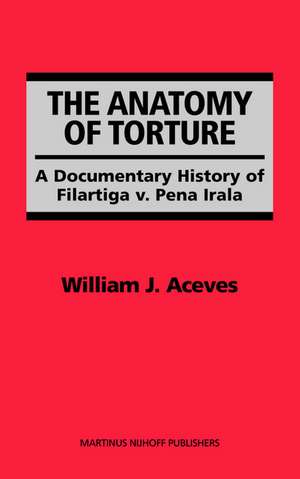The Anatomy of Torture: A Documentary History of Filartiga v. Pena-Irala
Autor William J Acevesen Limba Engleză Hardback – 5 aug 2007
This is the story of Filartiga v. Pena-Irala, one of the most significant examples of human rights litigation in the U.S., presented as a documentary history – an approach to legal scholarship that has become increasingly popular in recent years. Unlike traditional casebooks, this book emphasizes the dynamic nature of law. The pleadings and documents appear with minimal editing and are supplemented through commentary by various litigation participants.
Published under the Transnational Publishers imprint.
Preț: 915.04 lei
Preț vechi: 1115.91 lei
-18% Nou
Puncte Express: 1373
Preț estimativ în valută:
175.13€ • 189.05$ • 146.85£
175.13€ • 189.05$ • 146.85£
Carte indisponibilă temporar
Doresc să fiu notificat când acest titlu va fi disponibil:
Se trimite...
Preluare comenzi: 021 569.72.76
Specificații
ISBN-13: 9781571053527
ISBN-10: 1571053522
Pagini: 793
Dimensiuni: 155 x 235 x 45 mm
Greutate: 1.22 kg
Editura: Brill
Colecția Brill | Nijhoff
ISBN-10: 1571053522
Pagini: 793
Dimensiuni: 155 x 235 x 45 mm
Greutate: 1.22 kg
Editura: Brill
Colecția Brill | Nijhoff
Cuprins
Chapter 1: Introduction
Chapter 2: Filartiga v. Pena-Irala: The Birth of Transnational Litigation
A. Death in Paraguay
B. Justice in America
Chapter 3: Filartiga and the Development of Transnational Litigation
A. Extending Filartiga Through Legislation
1. Torture Victim Protection Act
2. Anti-Terrorism Act
3. Foreign Sovereign Immunities Act
B. Extending Filartiga Through Litigation
1. Argentina: Forti v. Suarez-Mason
2. Burma: Doe v. Unocal
3. Chile: Cabello v. Fernandez-Larios
4. Ethiopia: Abebe-Jira v. Negewo
5. The Philippines: In re Marcos Human Rights Litigation
6. Former Yugoslavia: Kadic v. Karadzic
C. Holocaust Litigation
D. Sosa v. Alvarez-Machain: The Supreme Court Speaks
Chapter 4: Conclusion
Appendix: Litigation Documents and Related Materials
Chapter 2: Filartiga v. Pena-Irala: The Birth of Transnational Litigation
A. Death in Paraguay
B. Justice in America
Chapter 3: Filartiga and the Development of Transnational Litigation
A. Extending Filartiga Through Legislation
1. Torture Victim Protection Act
2. Anti-Terrorism Act
3. Foreign Sovereign Immunities Act
B. Extending Filartiga Through Litigation
1. Argentina: Forti v. Suarez-Mason
2. Burma: Doe v. Unocal
3. Chile: Cabello v. Fernandez-Larios
4. Ethiopia: Abebe-Jira v. Negewo
5. The Philippines: In re Marcos Human Rights Litigation
6. Former Yugoslavia: Kadic v. Karadzic
C. Holocaust Litigation
D. Sosa v. Alvarez-Machain: The Supreme Court Speaks
Chapter 4: Conclusion
Appendix: Litigation Documents and Related Materials
Recenzii
Filartiga v Pena-Irala is a landmark decision in international human rights law. Dozens of human rights cases have built upon the Filartiga precedent, including those against former dictators like Ferdinand Marcos and U.S. corporations complicit in abuses abroad. ... Thankfully, Aceves never forgets the human story behind the Filartiga case. His summary of the case is thorough yet accessible, as is his account of the entire body of human rights litigation it created. ... Lawyers and law students will undoubtedly find Aceves’ history of enormous interest. – Paul Hoffman, review of The Anatomy of Torture: A Documentary History of Filartiga v Pena-Irala, by William J. Aceves, Amnesty International Magazine (Fall 2007) 22
Notă biografică
William J. Aceves is a Professor of Law and Director of the International Legal Studies Program at California Western School of Law, where he teaches Civil Procedure, Comparative Law, Foreign Affairs Law, and Human Rights Law. Professor Aceves has written numerous articles on human rights and international law. He frequently works with Amnesty International, the Center for Justice & Accountability, the Center for Constitutional Rights, and the American Civil Liberties Union on projects involving the domestic application of international law. Professor Aceves has also represented several human rights and civil liberties organizations as amicus curiae counsel in cases before the federal courts, including the U.S. Supreme Court.
